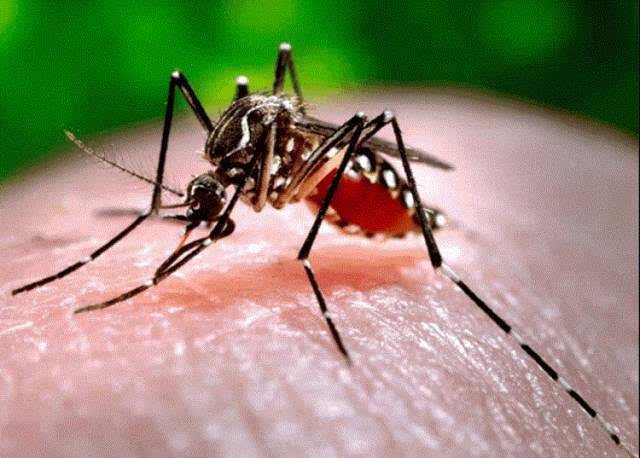(单词翻译:单击)
听力文本
Climate Change May Affect Dengue and Malaria Disease Risks
The future may mean more dengue and less malaria in parts of Africa if the planet continues to warm, a new study says.
Humans contract the diseases through mosquito bites.
The Anopheles mosquito carries a parasite that causes malaria. Dengue is caused by a virus carried by the Aedes mosquito.
These two mosquitos also do best in different climates. Malaria mosquitos thrive in temperatures of about 25 degrees Celsius. Dengue mosquitos like it hotter, by about 4 degrees.
Erin Mordecai is assistant professor of biology at Stanford University in California. She is the lead writer of the study. Mordecai said climate change may weaken the spread of malaria but increase the spread of dengue.
Combining mosquito temperature data, population numbers, and climate expectations, the researchers predicted malaria and dengue risks for Africa.
The dengue mosquito is expected to spread across sub-Saharan Africa fully by 2080. And a resulting rise in dengue cases is not the only worry. Aedes mosquitoes can also carry chikungunya, Zika and yellow fever viruses.
At the same time, the researchers say, malaria risk will drop as Anopheles mosquitos move further south and into mountainous areas seeking cooler temperatures.
The researchers say that the growth of cities in Africa may further increase the risk of dengue. The Aedes mosquito reproduces in very small, often human-made, containers, like bottle covers. Such environments are more commonly found in cities, said Mordecai. The Anopheles mosquito lays its eggs in larger, natural bodies of water, like lakes and rivers.
Cities are usually also warmer than surrounding rural areas — a better environment for the heat-loving Aedes.
"We're predicting that dengue is going to become a much bigger problem in Africa," said Desiree LaBeaud, who helped write the study. She is an expert on infectious diseases in children at Stanford University.
Africa is probably not well-prepared to fight dengue, she said. It has fought the spread of malaria with some success, but dengue will require new preventative measures.
And, Mordecai says, tools for identifying dengue disease are not widely available on many parts of the continent.

Generations of scientists and technicians have had training and experience in controlling malaria mosquitoes. But the dengue mosquito is a "very different creature and a different enemy," says Philip McCall, a researcher at Liverpool School of Tropical Medicine in the United Kingdom. He was not involved in the study.
McCall notes other studies have shown links between climate change and dengue.
"It's more likely you would have an increase in dengue, or possibly chikungunya and Zika," growing into a serious problem in cities, he said.
"But I can't see malaria, which is so established in Africa, disappearing easily. So it could become like double-trouble," he added.
Joacim Rocklv is professor of epidemiology at Umeå University in Sweden. He was not involved in the Stanford study. But he points out that it is limited. It only considers a "very fossil fuel-intensive future, which some people think is a little bit unlikely," he said. If you change those projections, he added, "then you might see quite different results" in connection to malaria.
The best way to control dengue is by removing containers that hold still water. This gives the mosquitoes fewer places to reproduce. Another way is to make sure containers are fitted with tight covers.
But there is also new hope for a different kind of dengue control.
A natural bacterium called Wolbachia blocks the dengue virus from reproducing in the mosquito and prevents spread. A trial involving release of Wolbachia-infected mosquitoes in Indonesia was found to reduce dengue cases.
These mosquitoes have reduced the spread in a huge area of Yogyakarta by 77 percent, "which is incredible," said McCall.
I'm Alice Bryant.
重点解析
重点讲解:
1. be expected to do sth. 预料;预期;预计;
The strike is expected to cause delays and disruption to flights from Britain.
预计罢工将导致英国航班的延误和中断。
2. be going to do sth. 将要,即将(发生);
I think it's going to be successful.
我认为这事会成功。
3. point out 指出,说出(事实或错误);
We all too easily point out our mothers 'failings.
我们都太过轻易地指出母亲的缺点。
4. in connection to 关于;与…有关;
Following the attack the Police detained Faisal Shahzad, a Pakistani-American, from JFK airport in connection to the bombing.
攻击发生后,警方在甘乃迪机场拘留了与本次炸弹事件有关的美籍巴基斯坦人费萨尔·沙赫扎德。
参考译文
气候变化可能影响登革热和疟疾的风险
一项新研究表明,如果地球继续变暖,那未来非洲部分地区可能会出现更多登革热病例,而疟疾病例则会减少。
蚊虫叮咬导致人类感染疾病。
按蚊携带着一种引起疟疾的寄生虫。而登革热由伊蚊携带的病毒所引起。
这两种蚊子最适应的气候条件也有所不同。传播疟疾的蚊子在25摄氏度左右的温度下茁壮成长。而传播登革热的蚊子喜欢比按蚊热大约4度的环境。
艾琳·莫德凯是加州斯坦福大学的生物学助理教授。她是这项研究的首席作者。莫德凯表示,气候变化可能会削弱疟疾的传播,但增加登革热的热播。
结合蚊子温度数据、种群数量以及气候预期,研究人员预测了非洲疟疾和登革热的风险。
到2080年,预计传播登革热的蚊子将在撒哈拉以南非洲地区全面扩散。而登革热病例的增加并不是唯一令人担忧的事情。伊蚊还可能携带基孔肯雅病毒、寨卡病毒和黄热病病毒。
同时,研究人员表示,随着伊蚊继续向南迁移,进入山区寻求更凉爽气温,疟疾的风险将会下降。
研究人员表示,非洲城市的增长可能进一步增加登革热的风险。伊蚊在非常小的、通常是人造的容器里繁殖,比如瓶盖。莫德凯表示,这种环境在城市里更为常见。而按蚊在较大的自然水体中产卵,比如湖泊和河流。
城市的温度通常比周围的农村地区更高,是更适合嗜热伊蚊的环境。
帮助撰写这项研究的德西蕾·拉宾德表示,“我们预测登革热在非洲将成为一个更大的问题。”她是斯坦福大学儿童传染病专家。
她说,非洲可能尚未做好抗击登革热的准备。非洲在抗击疟疾传播方面取得了一定的成功,但登革热需要新的预防措施。
莫德凯表示,此外,在非洲大陆的许多地方,用于识别登革热疾病的工具尚未广泛应用。
数代科学家和技术人员都接受过控制疟疾的培训,而且有相关经验。但英国利物浦热带医学院的研究员菲利普·麦克考尔表示,传播登革热的蚊子是“截然不同的生物,也是不同的敌人”。他并未参与这项研究。
考克考尔指出,其他研究也证明了气候变化与登革热之间的联系。
他说,“登革热、基孔肯雅病和寨卡病毒病例很可能增加”,继而成为城市的严重问题。
他补充说,“但我认为,在非洲极为猖獗的疟疾不会轻易消失。因此,这可能成为双重麻烦。”
阿西姆·洛克勒夫是瑞典于默奥大学的流行病学教授。他并未参与斯坦福的研究。但他指出这项研究存在局限性。他说,该研究只考虑了“极为化学燃料密集型的未来,但一些人认为这不太可能。”他补充说,如果改变这些预测,“那我们可能会看到与疟疾有关的完全不同的结果”。
控制登革热的最佳方法是移除装有静止水的容器。这会减少蚊子的繁殖地。另一种方法是确保容器装有密封盖。
但另一种登革热控制方法也存在希望。
一种名为沃尔巴克氏菌的天然细菌能阻止登革热病毒在蚊子体内繁殖,并阻止其传播。印度尼西亚进行的释放沃尔巴克氏菌感染蚊子的试验被发现可以减少登革热病例。
这些蚊子使日惹市广大地区的传播减少了77%,麦克考尔说,“这真是不可思议。”。
爱丽丝·布莱恩特报道。
译文为可可英语翻译,未经授权请勿转载!


